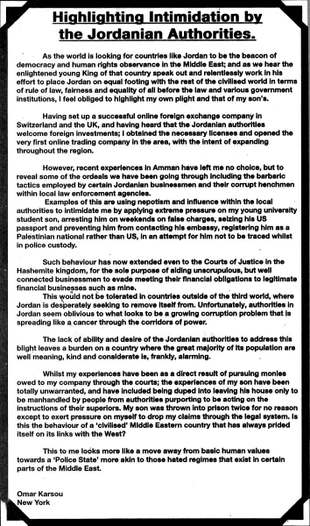by Natasha Tynes | Dec 10, 2006 | Weblogs
 I just finished reading a profile on Arianna Huffington, the founder of the Huffington Post, which, according to London’s Observer, is one of the world’s most influential media outlets. The profile sheds light on Huffington’s strong and vocal personality, one which attracts the attention of media moguls, Hollywood celebrities and politicians. Here are some excerpts of the profile:
I just finished reading a profile on Arianna Huffington, the founder of the Huffington Post, which, according to London’s Observer, is one of the world’s most influential media outlets. The profile sheds light on Huffington’s strong and vocal personality, one which attracts the attention of media moguls, Hollywood celebrities and politicians. Here are some excerpts of the profile:
To watch Arianna at work is to see a human blog in action. Each air kiss seems like the click of a computer’s mouse, each handshake a link to another potential blogger in an ever-growing network of movers and shakers. No wonder she has prospered in the world of the web. At the Time lunch she meets Hollywood star Emilio Estevez. Click. Later, at the Council on Foreign Relations, the glamorous Hungarian-American chess grandmaster Susan Polgar eagerly presses her business card into her hand. Click. By evening she is at CNN headquarters where top anchor Paula Zahn greets her with a girlish exclamation: ‘Arianna!’ Click
And there’s more:
She embraces some of the mockery, turning it deftly on itself. At pretty much any public appearance, she rapidly disarms the crowd with a self-mocking reference to her accent. ‘Everyone on this panel has an accent,’ she says at the CFR, where she shares a stage with a Russian businessman, an Italian neuroscientist and a Canadian journalist. ‘It’s great for me to be not the only person with an accent.’ The crowd laughs and is instantly won over.
Read the whole profile here. Hat tip: [Euroarabe]

by Natasha Tynes | Dec 8, 2006 | Books
Very few books manage to put a smile on my face these days. I really do not know what’s happening to me but the number of books that I hate is far larger than the ones that I like.
Dancing Arabs, however, is one that I’m absolutely falling in love with. I’m already halfway through, and so far, not a single chapter has managed to disappoint me. The story, originally written in Hebrew by Arab-Israeli author Sayed Kashua, is a tale about the tiresome hunt for somewhere to belong.
It sheds light on the lives of Arab-Israelis and their constant struggle to determine their identity. The book portrays the life of the protagonist as someone living on the periphery, in limbo. He is stuck in two worlds, miserably failing to belong to either one. The writing style is absolutely gripping but whimsical and very comical at times.
Here is an excerpt:
I look more Israeli than the average Israeli. I’m always pleased when Jews tell me this. “You don’t look like an Arab at all,” they say. Some people claim it’s a racist thing to say, but I’ve always taken it as a compliment, a sign of success. That’s what I’ve always wanted to be, after all: a Jew. I’ve worked hard at it, and I’ve finally pulled it off.
One paragraph that I personally identified with is this one:
The Arab newspapers wrote a story about a goat that could say “Sadaa – aa- aam.” Then people began seeing Saddam’s face in the moon. When I came home, my father couldn’t believe I didn’t see it myself. He took me outdoors and tried for hours to explain where I should look: where the nose was, where the mouth was, where the mustache was, and the beret. In the end, I did see him. It really did look like him. Not just like him — It was him. Look straight up.
I was almost thirteen when the first Gulf War took place. Back then, Jordanians were cheering for Saddam. All my classmates were seeing Saddam’s face on the moon. They used to come to school telling stories of their visions from the night before. One night, I grabbed my ten-year-old sister by the hand and told her that tonight was the night, that we had to do our best to see Saddam after our earlier failed attempts.
We walked to the end of our bedroom and looked out from the window at the dark blue, starless sky. We could see the moon clearly. It was a full one that night. We stared and stared. I squinted hard until I saw the mouth, the eyes, and even the mustache.
“Look, I see him. Saddam is on the moon. Do you see him now?” I asked my sister.
“I do,” she said before dragging herself back to bed.
Author Laila Lalami hails this book on her blog. Here is a link to her review of the book. She concluded her review with the following statement:
Dancing Arabs is a difficult book for both Arabs and Jews to read–neither group is shown in a particularly good light, and, no doubt, people on either side will be angered by the mirror that the writer holds up– yet Kashua’s unsparing account is a necessary read for both.
Do read this book if you get the chance. It is a treat.
by Natasha Tynes | Dec 1, 2006 | Jordan, my nation, Media watch, The Disturbing
 |
While the world’s eyes are focused on Jordan these days, I was shocked to find a quarter page anti-Jordan ad in The Washington Post yesterday [image enlarges on click]. The ad, entitled Highlighting intimidation by the Jordanian authorities was signed by a New York-based businessman named Omar Karsou.
In the ad, Karsou alleges that his son was intimated and harassed by the Jordanian authorities due to the father’s dealings with some Jordanian businessmen. Karsou concluded his ad with the following:
This to me looks more like a move away from basic human values towards a police state more akin to those hated regimes that exist in certain parts of the Middle East.
I never heard of this case or this businessman before reading this ad. Karsou obviously has a grudge, as he was wailing to pay big money to broadcast his case to the world and try to put Jordanian authorities to shame.
Of course, we are only hearing one side of the story. We really do not know what happened. Nor do we know if his allegations are accurate. Regardless, I believe Jordanian authorities should reply to his ad and publish a rebuttal ad — one that offers some explanations — in the same spot in the Post, if possible. Those, like myself, that read the ad yesterday, need to hear an official Jordanian response to such serious allegations, ones which seemed primarily aimed at tarnishing the image of Jordan.
|
Update: Omar Karsou left a comment on this blog with a bit more detail, saying:
Natasha,
I do not have a personal grudge against Jordan, or the majority of
Jordanians. I love that country, I spent the better part of life in it.
But I happen to love my Son just as much, if not more.. Anyway, before
I placed the ad, I contacted the Jordanian Embassy in Washington,
pleaded with them to help out, even sent them a draft of the ad, to no
avail. Again, I am pleading with the Jordanian authorities to let
justice take it’s course, clamp down on corrupt officials. Only then
will I have achieved my "objective", which I believe, is yours too.
Omar
 I just finished reading a profile on Arianna Huffington, the founder of the Huffington Post, which, according to London’s Observer, is one of the world’s most influential media outlets. The profile sheds light on Huffington’s strong and vocal personality, one which attracts the attention of media moguls, Hollywood celebrities and politicians. Here are some excerpts of the profile:
I just finished reading a profile on Arianna Huffington, the founder of the Huffington Post, which, according to London’s Observer, is one of the world’s most influential media outlets. The profile sheds light on Huffington’s strong and vocal personality, one which attracts the attention of media moguls, Hollywood celebrities and politicians. Here are some excerpts of the profile:

